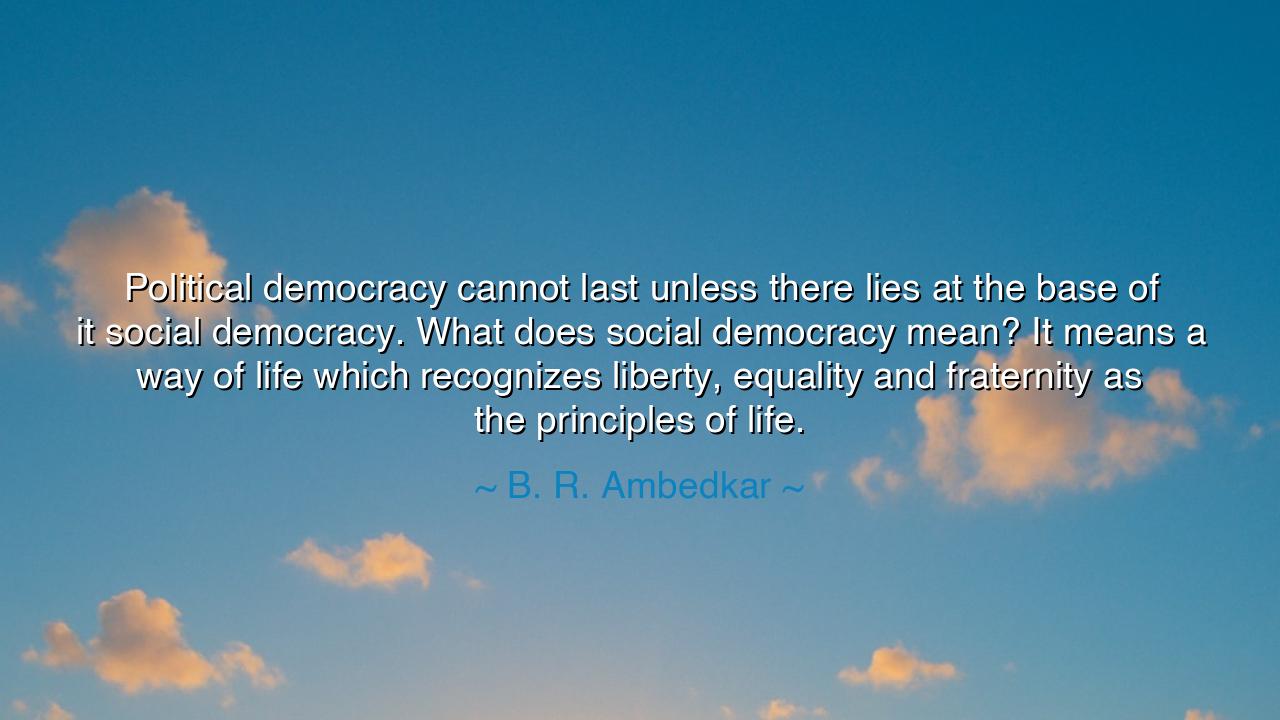
Political democracy cannot last unless there lies at the base of
Political democracy cannot last unless there lies at the base of it social democracy. What does social democracy mean? It means a way of life which recognizes liberty, equality and fraternity as the principles of life.






The words of Bhimrao Ramji Ambedkar, father of India’s Constitution and tireless champion of justice, resound with prophetic wisdom: “Political democracy cannot last unless there lies at the base of it social democracy. What does social democracy mean? It means a way of life which recognizes liberty, equality, and fraternity as the principles of life.”
In these words, he gave not merely a political doctrine but a moral law — one that binds the destiny of nations to the conscience of their people. Political democracy may build the institutions of freedom — the vote, the parliament, the courts — but social democracy alone can preserve their soul. Without justice between hearts, justice within laws cannot endure.
Dr. B. R. Ambedkar, born in 1891 into a society fractured by caste, rose from oppression to become one of the most learned and courageous voices of the modern age. He studied law and philosophy in the great universities of the world, yet never forgot the suffering of his people. When he spoke of democracy, he spoke not as a theorist but as one who had known humiliation and exclusion. To him, liberty, equality, and fraternity were not abstractions; they were sacred necessities, the foundation upon which human dignity stands. And so he warned that if democracy remained only political — confined to elections and constitutions — it would one day collapse beneath the weight of social inequality.
The origin of this quote lies in Ambedkar’s closing speech to the Constituent Assembly of India on November 25, 1949 — the eve of the nation’s rebirth. India had achieved freedom from British rule, but Ambedkar saw another struggle ahead: the liberation of society from the tyranny of caste, privilege, and prejudice. He cautioned that political liberty without social harmony would be like a body without a soul. His words, though spoken for his country, speak to all nations — for no democracy can survive where some are chained by poverty or hatred while others walk free in comfort.
To understand Ambedkar’s warning, one may recall the fall of ancient Rome, where freedom was granted to citizens but denied to slaves. The republic rotted from within because its democracy rested upon inequality. Or consider the revolutions of modern times, where the cry for liberty often led to tyranny because fraternity was forgotten. Ambedkar’s insight was that democracy is not a machine that runs on its own; it is a living spirit, nourished by compassion and equality. Without fraternity — the sense that all human beings are bound together by shared destiny — liberty turns into privilege, and equality becomes resentment.
He drew inspiration from the French Revolution’s trinity — Liberty, Equality, Fraternity — yet gave it deeper meaning. For Ambedkar, these were not merely political ideals but ethical duties. Liberty must not be the license of the strong, but the freedom of all; equality must not be legal formality, but lived reality; and fraternity — the love of one human being for another — must be the invisible thread holding both together. In his vision, social democracy was not merely an arrangement of society, but a way of life, a discipline of mutual respect and moral responsibility.
History has often proved him right. Where societies have upheld equality in law but denied it in practice, democracy has withered. Where liberty has been prized above compassion, freedom has turned cruel. Yet where fraternity has flourished — as in the movements of Martin Luther King Jr. or Nelson Mandela — political freedom has found its moral heart. Ambedkar’s wisdom thus reminds us that democracy begins not in parliaments, but in the conscience of the people.
So, my child, take this teaching as a sacred charge. To be a citizen is not enough; one must be a custodian of justice. Do not let liberty become selfishness, nor equality become envy. Cultivate fraternity — in your home, in your work, in your thoughts — for every act of kindness strengthens the pillars of democracy. If you would keep freedom alive, live by Ambedkar’s creed: honor liberty, practice equality, and embody fraternity. For only when these three walk together — in the hearts of people as well as in the laws of nations — will democracy endure as a living, breathing truth, unshakable as the mountains and as eternal as the soul.






AAdministratorAdministrator
Welcome, honored guests. Please leave a comment, we will respond soon